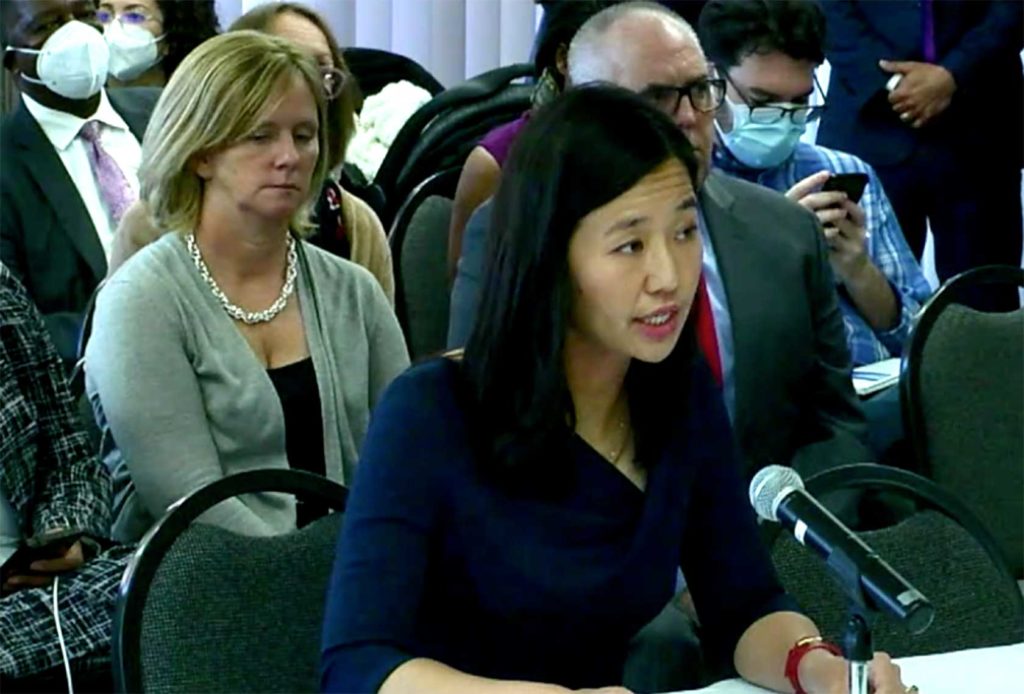State releases report on BPS as parents protest
Elected officials speak in opposition to receivership

Teachers and parent activists protested outside One Ashburton Place Tuesday morning while the state’s Board of Elementary and Secondary Education discussed its review of the Boston Public Schools in what’s widely perceived as a precursor to state intervention into Massachusetts’ largest school district.
The review comes amid growing opposition to state intervention. Last Thursday, American Federation of Teachers President Randi Weingarten and former state Secretary of Education Paul Reville joined Boston Mayor Michelle Wu and other education leaders to highlight the city’s planned $2 billion investment in BPS school building improvements. Both Weingarten and Reville, an author of the 2010 law that allows the state to place districts in receivership, have come out against a state intervention in Boston’s schools.
Testifying before the board, Wu said her administration has during the first six months of her term in office laid the groundwork to make lasting improvements to the schools, said the city is making progress in its search for a new school superintendent. She asked that the state not intervene.
“Receivership would be counterproductive in light of this transition and superintendent hiring process now underway, and the strides we’re making in collaboration with the state,” she said. “If the commissioner does put forward a proposal for the board to designate and take over the Boston Public Schools, we will be requesting a hearing and due process under the board’s laws and regulations to continue to make our case that no one is better equipped to accelerate the progress Boston has made with our Boston Public Schools communities.”
Among those testifying during the hearing were state Sens. Sonia Chang Diaz and Lydia Edwards, state Rep. Liz Miranda, City Council President Ed Flynn, and at-large Councilors Michael Flaherty and Erin Murphy.
Edwards pointed out that the state will have a new governor in January, when Gov. Charlie Baker’s term ends.
“Why would you also put this on the new governor’s plate as well?” she said.
While the elected officials called on the state to back away from its push to intervene in BPS, Flaherty asked the board to consider a targeted partnership with the district.
“Our district continues to fail thousands of students, particularly our most vulnerable,” he said, directing criticism at the BPS central office. “Our superintendent and the central office need to be held accountable for the failure to provide each school, each teaching professional, with adequate support and tools they need to thrive.”
Murphy told the board she wants what’s best for the students, but she did not speak for or against receivership.
The BESE review is a follow-up to a 2020 review that found BPS is not providing adequate services to English language learners and students with disabilities in accordance with state guidelines. The review also highlighted deficiencies in the district’s busing, in the condition of school bathrooms and in school curriculum and graduation requirements. Commissioner of Elementary and Secondary Education Jeff Riley raised the possibility of receivership or an empowerment zone model, in which a cohort of schools the state designates as “underperforming” is removed from local district control.
Receivership and the empowerment zone model have become increasingly controversial. None of the three districts the state has put in receivership has shown appreciable improvements in student test scores — the main metric the state uses to make the case for such interventions. In the state’s only empowerment zone, the Springfield Empowerment Zone Partnership, the cohort of schools removed from district control show lower student test scores than the district as a whole. Additionally, two Boston schools placed under state receivership — the Dever and Holland schools — have been plagued by mismanagement and, in the case of the Holland, abnormally high suspension rates of kindergarteners. Neither has shown significant improvement in students’ test scores.
The new report acknowledges that the district has made progress in the areas highlighted in its 2020 report, but states that instruction for English language learners remains inadequate and that special needs students are still being educated in substantially separate classrooms. The report also highlights 31 schools in which students’ test scores place them in the lowest 10% of schools in the state, and asserts that the district has not done enough to improve those schools.
“While numerous instructional initiatives are underway, the lack of coherent improvement systems and capacity to provide targeted support to the district’s 31 lowest-performing schools is highly concerning,” the report reads.
Notably, the report makes little mention of the COVID pandemic, which forced school districts across the nation to pivot to remote learning beginning in March 2020 — at the same time BPS officials entered into a memorandum of understanding with DESE to make improvements to the school system. For instance, the report highlights the district’s struggles with on-time school buses but makes no mention of how that problem has affected districts across the nation, with more than half reporting severe staffing shortages.
While the 2020 review relied heavily on student scores on the state’s Massachusetts Comprehensive Assessment System (MCAS) test, because that test was suspended for a year during remote learning and because students across the state and across the nation have shown declining test scores during the pandemic, state evaluators did not use such data in their review this year.
Instead, they toured school facilities and relied on observations and evaluations of teachers in some of the district’s 121 schools.
Additionally, the report hits the district for faulty data reporting, noting that buses that do not show up aren’t counted as late in the district’s reporting, and that two of the 29 bathrooms the district reported repairing were not, in fact, repaired.
The report highlighted progress the district made, noting improvements in curriculum and alignment of graduation requirements with state standards.
BESE is expected to make its decision on how and whether to intervene in BPS before the end of June.







